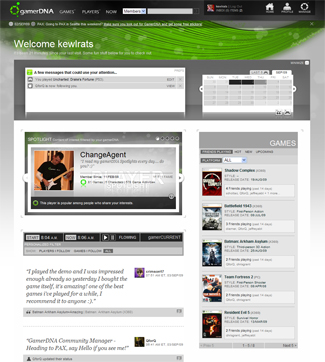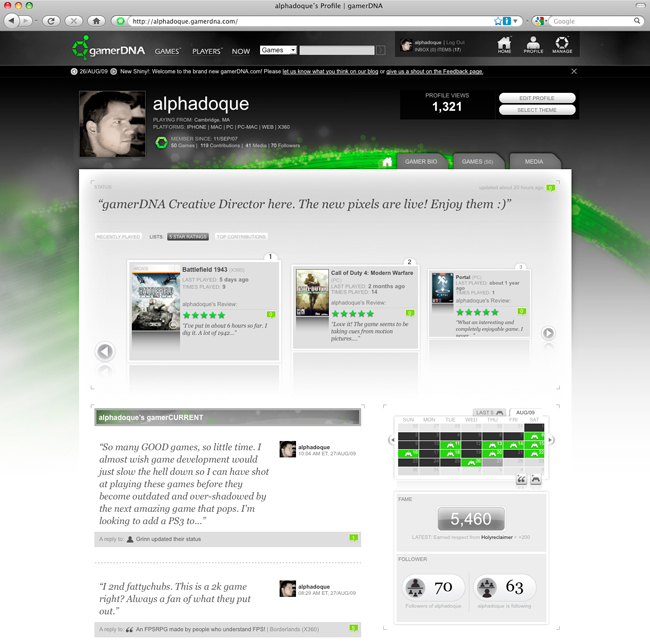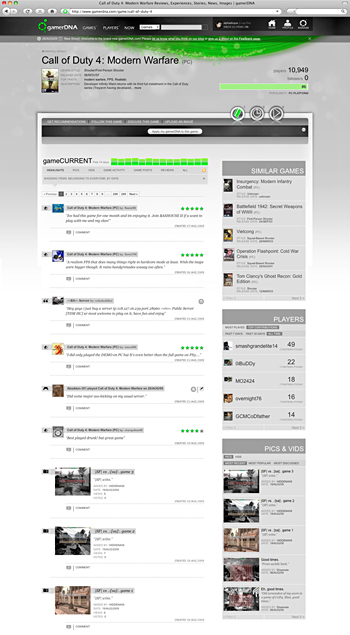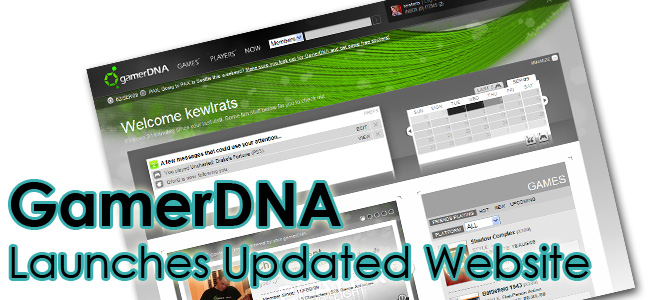I’ve been a member of GamerDNA for at least a year now, if not longer. I used the website, albeit sporadically, to check up on my achievements, some recommended games, and to see what other like-minded gamers were playing. I would never call it my hub, though. Facebook holds that mantle. With a recent relaunch the site now provides a solid experience for any gamer looking to connect with friends, combining the best of popular social networks with a gaming-centric twist.
I had the opportunity to spend some time on Monday being shown a walk-through of the new site by GamerDNA Online Marketing Manager Sam Houston.
Read on for my thoughts on how this budding social network has what it takes to be a prime player in the gaming world.
Building an online community for gamers is not necessarily challenging. However, creating one that can maintain their attention away from forums, blogs, and actual gaming itself is a monstrous feat. (We should know, since our forum is taking a wee bit of time to get moving itself.) GamerDNA has been around long enough to understand this, shifting its focus into a more real-time social connection to the games and players.

The first thing I noticed when demoing the latest revision of the website was the home page. The flow of real-time content, called the “gamerCURRENT”, is displayed on the page showcasing the latest news, posts, and gaming habits of players and games that I follow. Following on GDNA is much like on Twitter: find people who share similar gaming interests and follow their updates. The same goes for videogames as GamerDNA allows for both manual selection of games played and matching of habits based on what games I’ve played and own. Comments, reviews (provided by CrispyGamer), and media uploaded to the site for each game appear in the CURRENT if followed, with full preferences available to adjust the amount of information should the CURRENT become as overflowing as my Twitter page.
Also to note was the spotlight (showcasing players, games, and news relevant to my likes and gaming habits), my own recent GamerDNA activity (such as games played, new followers, or comments), and games that my friends are playing.
I liken the home page to being similar to Facebook’s: all of the latest information that I care about is there and is fully-customizable. The only thing perhaps lacking would be the ability to bring in Twitter, Facebook, or other outside social media feeds that my friends are linked to. However, Sam didn’t rule out the possibility of the inclusion of these features down the line only that for now GamerDNA is focused on creating a holistic experience that is appealing to the users to easily maintain the information most important to them. Also noted was that the GamerDNA API is fully realized and easy to work with, so potential developers of third-party applications that want to access the data to create supplementary user experiences are encouraged.

The user profile pages are laid out well, allowing for easy access to information about what they’ve been up to, their bios, gaming information, and so on. The navigation is extremely easy, utilizing an NXE-style game info layout that I found was easy to comment on and interact with. It’s a now-familiar method of laying out game information on the web. I enjoyed the “fame” tally, a number that grows as people visit your bio, befriend you, and as you interact with the website. It’s a scoring system that makes for some nice side-competition between friends. I wish there was a fame leaderboard, though, as it would make me want to compare my score to others and tempt me to be even more active.

What impressed me most about the revamped site was the game information pages. The pages now show the latest reviews, players and gaming frequency, comments, media, etc etc ETC. The information is presented in a non-overwhelming manner, with the sidebars differentiating between the CURRENT and the content aspects. I’ve found many a like-minded gamer to follow because of the game pages, and the click-through rate to see what they are playing and enjoying is astounding. The game pages are highly sticky, so to speak.
With more focus on social-networking aspects the site’s revamp sets a precedent with gaming communities as a clean, fluid experience. After the launch, GDNA’s staff deserves as many high-fives as possible as they’ve created a community-focused site that sums up personal gaming tendencies, networking with friends, and opens users to new games that they might be interested in.
For more information, check out the revamped GamerDNA.


3 Comments